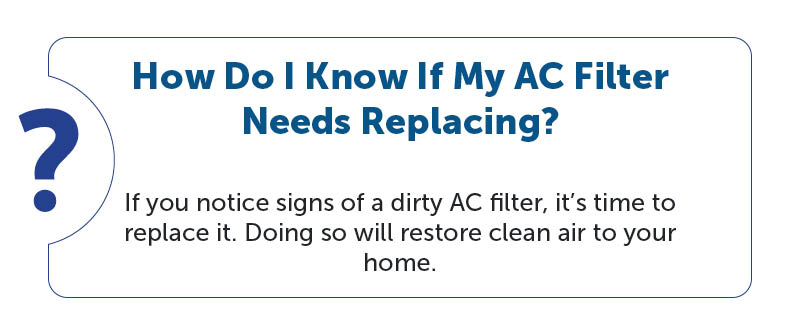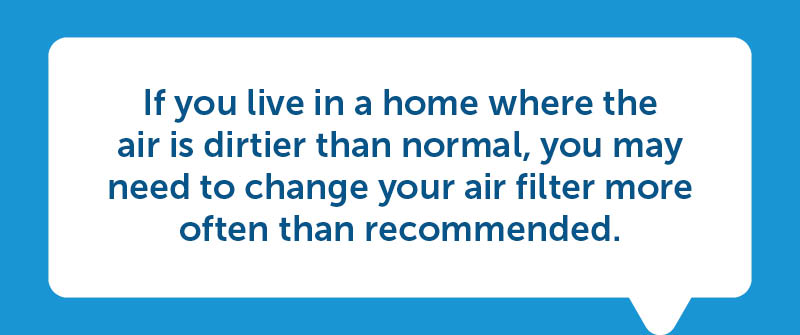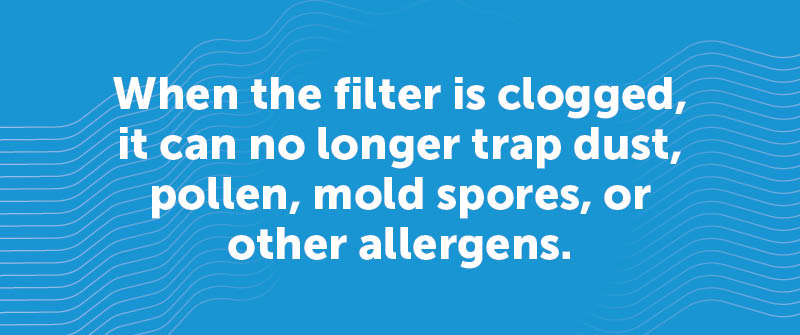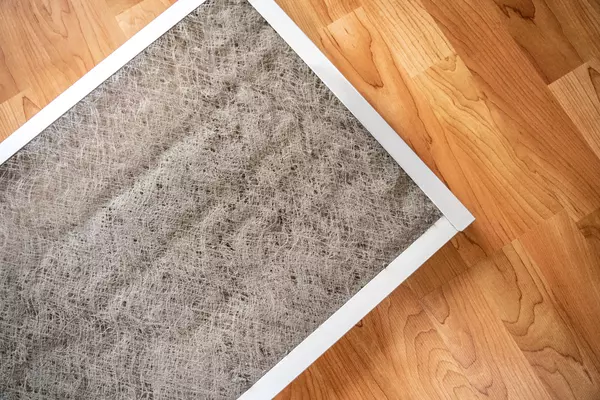The primary purpose of an AC filter is to clean the air you breathe in your home. It traps particles that circulate through the air conditioning system, air conditioner, ductwork, and every room in your house. Over time, the particles build up on the filter. As a result, the buildup restricts the airflow.
When airflow is restricted, it can cause problems with your air conditioner and ductwork. Fortunately, some signs tell you to replace your air conditioner filter.
Below, we look at how to know if AC and furnace filters need to be replaced. We also explore what happens when you don’t change the filter and how often your filter needs to be replaced. If you have further questions, feel free to contact Discount Filters.
How Do I Know If My AC Filter Needs Replacing?
Although the filter is hidden from plain sight, there are ways to tell if your air filter needs replacing in your house. Let’s look at four signs that a filter replacement is necessary:
- Visual inspection: Examine the filter for visible dirt, dust, or discoloration. If you can’t see through the filter or it appears gray instead of white, it’s time for a replacement.
- Reduced airflow: Check if the air coming from your vents feels weaker than usual. A clogged air filter restricts airflow.
- Increased energy bills: Monitor your monthly bills for unexpected spikes. A clogged air filter forces your AC system to work overtime, which results in it using more energy.
- Unpleasant odors: Pay attention to musty or bad smells from your vents. These odors indicate a dirty air filter that’s no longer effectively trapping contaminants.
If you notice these signs of a dirty AC filter, it’s time to replace it. Doing so will restore clean air to your home. Find out if you can change the HVAC filter yourself?

How Often Should AC Filters Be Changed?
On average, your HVAC will need an air conditioner filter replacement every 30 to 90 days, depending on the type of filter you use. However, other factors must be considered when deciding when to replace an AC filter. Let’s look at a few:
The Minimum Efficiency Reporting Value (MERV) rating is crucial in determining the quality and longevity of air filters. Filters with higher MERV ratings are better at holding contaminants but may reduce airflow in the AC system.
Manufacturer Recommendations
Your HVAC owner’s manual is the best place to find out what type of air conditioning filter you should use and how often to replace it. There should be a manual with your HVAC system. You can also download a . PDF manual online. Each manufacturer recommends the best type of air filter and how often to replace an air conditioner filter.
Air Conditioner Usage
If you keep the air conditioning unit on throughout the day during summer, you’ll need to replace the filter every 30 days. However, even with daily usage, some filters have a longer lifespan. For instance, pleated filters need a replacement every 90 days. 4” or 5” Media filters can last six to eight months. Standard fiberglass filters fall under the 30-day rule.
Environmental Factors for Air Filters
Dirty air inside and outside the house can impact how quickly dust and dirt build up on the air filter. If you live in a home where the air is dirtier than normal, you may need to change your air filter more often than recommended. If you live with smokers, own pets, or your home has excessive dust, an air conditioner filter replacement may be necessary twice a month. In such environments, replacing a new air filter every three months is crucial to maintain system efficiency and comfort.

What Happens If You Don’t Change Your Air Conditioner Filter?
Your AC filter plays a vital role in trapping dirt and dust particles that circulate through your house. Neglecting the filter can hurt your air conditioner and create a dirty home environment. Here are a few main problems that occur when you don’t change the filter:
- Poor air quality: A dirty air filter can’t trap dust, pollen, and pet dander. As a result, the particles circulate back into your home. They can reach concentrations 2-5 times higher than outdoor levels.
- Poor efficiency: As your filter becomes clogged, it restricts airflow and forces your AC to work harder. Poor airflow leads to increased energy consumption by up to 15%.
- Damaged HVAC system: A dirty air filter can cause your evaporator coil to freeze. Eventually, the compressor will fail. A repair or replacement can cost up to $2,000.
- Unbalanced cooling: Restricted airflow causes uneven cooling throughout your home. You may notice temperature differences of three to five degrees Fahrenheit between rooms.
If you maintain a filter replacement schedule, you’ll avoid these issues. The air conditioner will perform more efficiently and consistently keep your home cool throughout the summer.
Can a Dirty AC Filter Affect Indoor Air Quality and Make You Sick?
Clogged air filters can no longer trap dust, pollen, mold spores, or other allergens. Eventually, the particles circulate through your home. The quality of the air gets worse. When you inhale dirty air over time, it can have a lasting impact on your health.
For example, breathing in contaminants from clogged air filters can cause respiratory issues and allergies. It can also trigger asthma attacks. Mold growth on a clogged air filter can release spores that are harmful to your health. Changing the filter improves the air and helps you maintain a cleaner indoor environment.

What Are the Symptoms of a Dirty HVAC Filter?
An HVAC air filter can cause various problems in your home. Recognizing the symptoms of a clogged filter can help you address small issues before they become expensive problems. It can also help you maintain a healthy living environment. Here are some symptoms of a dirty air filter you need to look for:
Dust Accumulation
You may notice increased dust settling on surfaces throughout the house, affecting your AC unit. The filter can’t trap any more particles. So they circulate and settle everywhere. If you’re dusting more frequently or seeing a thin layer of dust after cleaning the house, it’s a clear sign that the filter needs attention.
Unusual Noises
When your HVAC filter becomes clogged, it forces your air conditioning system to work harder to circulate the air. The strain results in strange noises from your vents or the HVAC unit. You might hear whistling, rattling, or banging sounds that weren’t present before. Strange noises indicate that your system is struggling due to restricted airflow.
Hot and Cold Spots
A dirty filter can lead to uneven heating or cooling in your home. You may notice that some rooms are warmer or cooler than others. The clogged filter restricts airflow, preventing your HVAC system from distributing air evenly throughout your home. If you have to adjust the thermostat frequently to get balanced cooling, it’s time to check your filter.
Allergies and Respiratory Issues
Suppose your allergies or asthma worsen at home, and a dirty HVAC filter could be the culprit. The filter can’t trap the allergens, dust, or other irritants. The particles circulate through your home. They trigger your allergies, asthma attacks, or other respiratory issues. Replace the filter if you notice more frequent sneezing, coughing, or difficulty breathing indoors.
The Final Word
Many of the problems with your HVAC system are directly related to how dirty your air filter is. Changing your filter is a low-cost solution that only takes minutes to do. However, it has a big impact on your HVAC system. An AC filter replacement also contributes to a cleaner home environment. Learn the signs of a dirty filter to know if an AC filter needs to be replaced.
Order Your AC Filters Online From Discount Filters
At Discount Filters, we are committed to helping you maintain a clean and healthy home environment. We carry a wide range of quality AC filters from reputable brands you know and trust. Shop our online store to find the right filter for your air conditioner. Contact a filter specialist today if you have questions or need help ordering your filters. We’re here to help!

